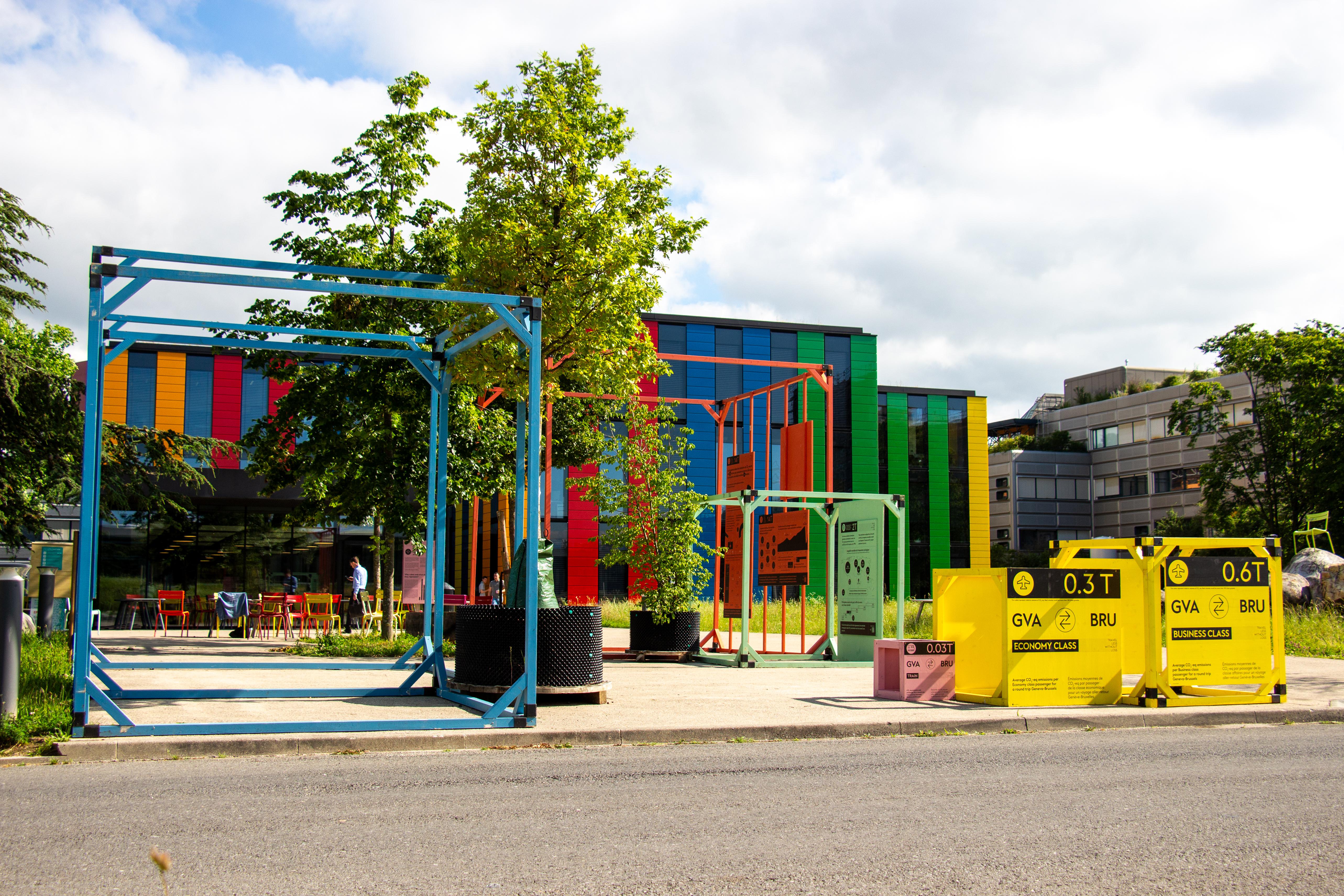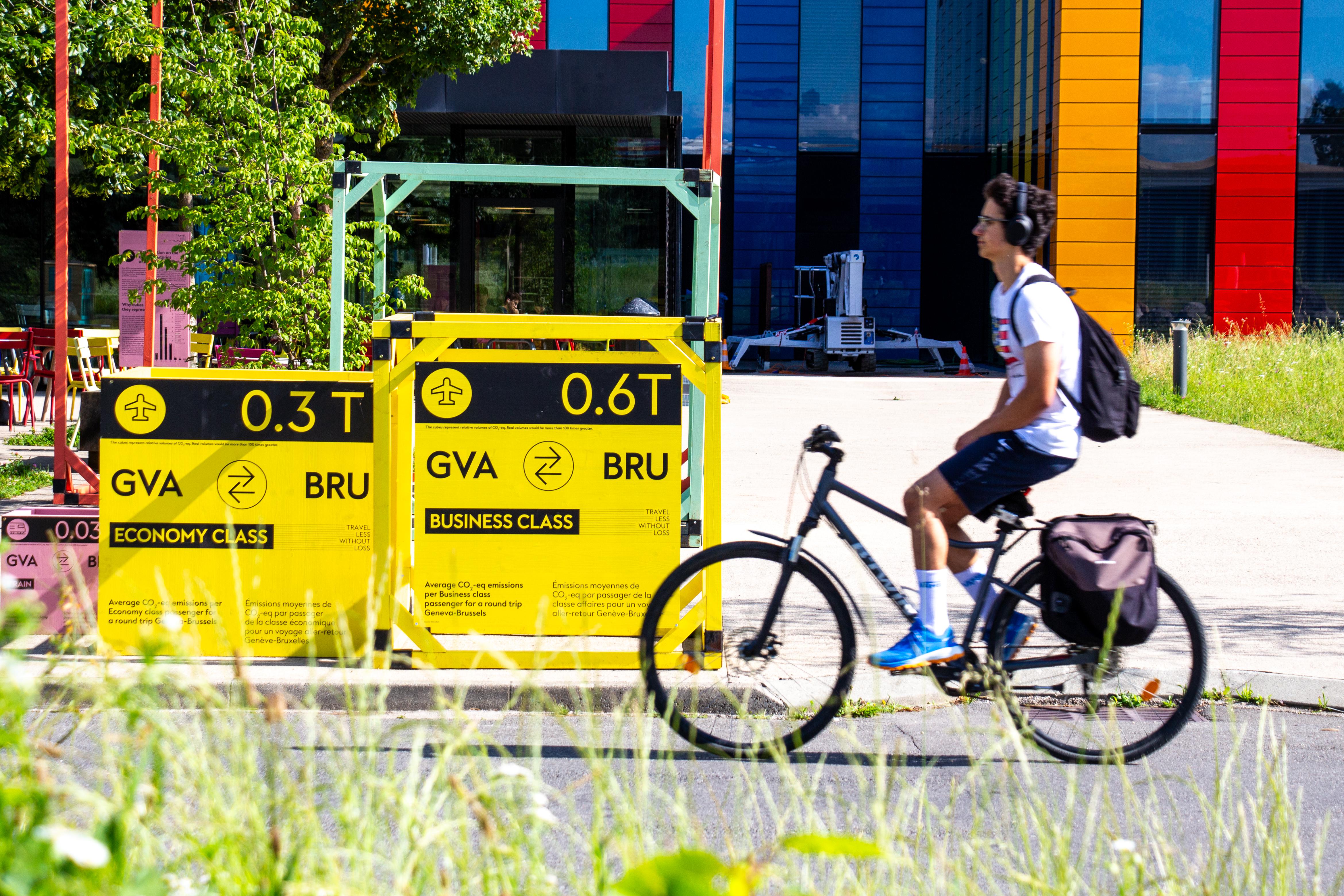Impact of air travel: from awareness to reduction

2024 EPFL/Chléa Schiff - CC-BY-SA 4.0
EPFL's campaign on carbon emissions from air travel has won a prestigious European award. The effects of the new travel policy are starting to be felt, with an 18% reduction in 2023 compared to 2019. But more efforts are needed.
More than 16,000 tonnes of CO2 equivalent: this figure, written in large letters on one of the panels of the Travel Less Without Loss installation, corresponds to the greenhouse gas emissions resulting from air travel by the EPFL staff and students in 2019. Together with other data, the information that makes up this exhibition shows the urgency of taking action to contain global warming.
After being on display throughout the autumn 2023 semester on EPFL's Place Ada Lovelace, the installation has just been reassembled in another strategic location on campus, opposite the Rolex Learning Center. It will remain there until the end of 2024.
Its originality lies in the fact that it is made up of giant cubes showing the proportions between desirable limits (a maximum of 2 tonnes of annual emissions per person) and the reality in Switzerland (14 tonnes), with examples of journeys, such as 10 tonnes for a round trip in business class to San Francisco, or 0.03 tonnes for a round trip by train to Brussels.
Bronze medal
The designer of this huge three-dimensional infographic, Sébastien Fasel of the Emphase agency, won a bronze medal for the project at the recent European Design Awards on May 31, 2024.
According to him, "the ambition and motivation of the Vice Presidency for Responsible Transformation and its Sustainability unit pushed us to think big. It made us want to design a more immersive form of infographics, one that made us feel a sense of experience. When we talk about tons of CO2, it's abstract for most people. We don't feel their weight on our shoulders. To visualize these volumes, to be able to enter into them, turn around them, etc., puts the data in relation to our own bodies, moving from the abstract to the concrete. And I think that this passage allows us to become more aware.
If the project had really been carried out on the scale of actual volumes of greenhouse gas emissions, the largest cube (average annual emissions of a person in Switzerland) would have been 19 metres high, which posed problems of feasibility, cost and sustainability. The decision was therefore taken to make the 2 tonnes per person allowable correspond to a quasi-human size, i.e. 2 metres high for the green cube, instead of 10 metres in a realistic simulation.
The reinstallation of the seven cubes on campus will enable delegations from several universities to view the exhibition when they visit the school on June 28, as part of the International Sustainable Campus Network conference, co-organized this year by EHL, the University of Lausanne and EPFL. This will be an opportunity to compare the various strategies used by the academic world to reduce its emissions.

Fewer flights, but still too many trips
At EPFL, the implementation of the new travel policy in 2023 seems to be starting to bear fruit, as tonnes of CO2 emissions last year fell to just over 13,000, a reduction of 18% on the reference figure given in the exhibition. If we consider only emissions from EPFL staff, not including student travel, then the drop is even 22%.
In fact, the number of business trips by EPFL staff members by air has fallen considerably, from 12,501 in 2019 to 6,737 in 2023 for continental flights, which can be explained in particular by the requirement to give preference to rail for destinations reachable in less than 6 hours, the preference for direct non-stop flights, the more frequent use of videoconferencing, and perhaps also the voluntary abandonment of certain travel projects.
However, the number of long-haul flights has risen slightly, from 5093 in 2019 to 5646 in 2023. Yet it is these trips that represent the largest environmental footprint. To achieve the reduction of at least 30% in carbon emissions from travel by 2030 called for in EPFL's Climate and Sustainability Strategy, it will be necessary to reduce the number of business trips to California and other far-flung destinations.
"We are delighted to see the first encouraging results from the introduction of the new travel policy at EPFL, despite the increase in campus population," says Luca Fontana, Head of Sustainable Mobility and Travel at the Sustainability Unit. “This significant 18% reduction in CO2 emissions compared to 2019 demonstrates EPFL's commitment to responsible academic travel and the importance of raising community awareness through initiatives such as the Travel Less Without Loss exhibition.”
